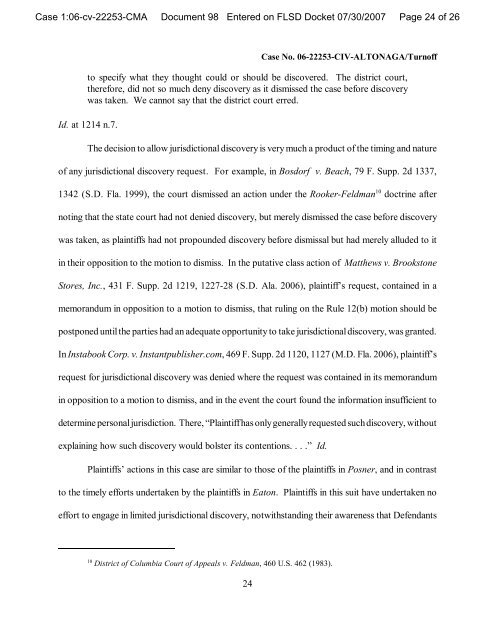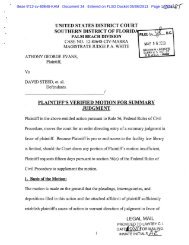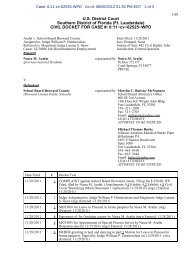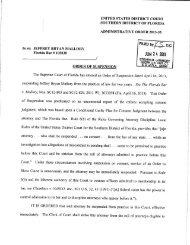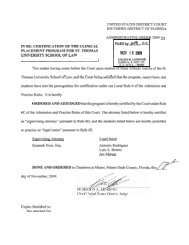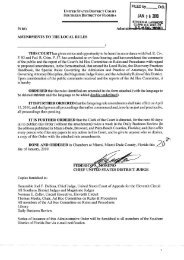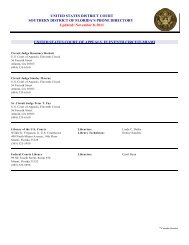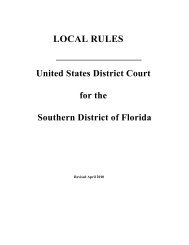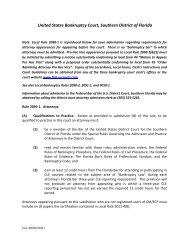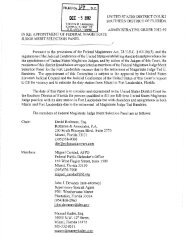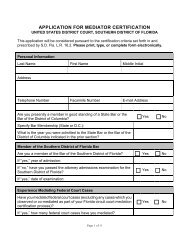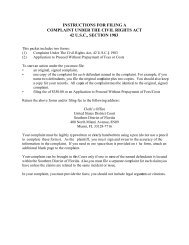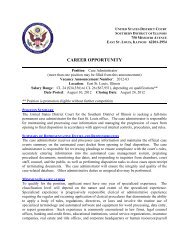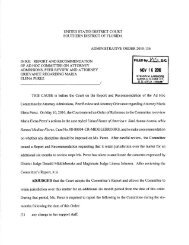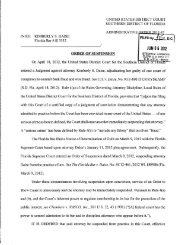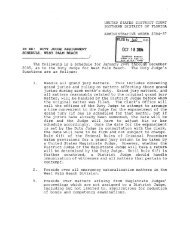ORDER granting Defendants' Motion to Dismiss; Plaintiffs'
ORDER granting Defendants' Motion to Dismiss; Plaintiffs'
ORDER granting Defendants' Motion to Dismiss; Plaintiffs'
Create successful ePaper yourself
Turn your PDF publications into a flip-book with our unique Google optimized e-Paper software.
Case 1:06-cv-22253-CMA Document 98 Entered on FLSD Docket 07/30/2007 Page 24 of 26<br />
10 District of Columbia Court of Appeals v. Feldman, 460 U.S. 462 (1983).<br />
24<br />
Case No. 06-22253-CIV-ALTONAGA/Turnoff<br />
<strong>to</strong> specify what they thought could or should be discovered. The district court,<br />
therefore, did not so much deny discovery as it dismissed the case before discovery<br />
was taken. We cannot say that the district court erred.<br />
Id. at 1214 n.7.<br />
The decision <strong>to</strong> allow jurisdictional discovery is very much a product of the timing and nature<br />
of any jurisdictional discovery request. For example, in Bosdorf v. Beach, 79 F. Supp. 2d 1337,<br />
10<br />
1342 (S.D. Fla. 1999), the court dismissed an action under the Rooker-Feldman doctrine after<br />
noting that the state court had not denied discovery, but merely dismissed the case before discovery<br />
was taken, as plaintiffs had not propounded discovery before dismissal but had merely alluded <strong>to</strong> it<br />
in their opposition <strong>to</strong> the motion <strong>to</strong> dismiss. In the putative class action of Matthews v. Brooks<strong>to</strong>ne<br />
S<strong>to</strong>res, Inc., 431 F. Supp. 2d 1219, 1227-28 (S.D. Ala. 2006), plaintiff’s request, contained in a<br />
memorandum in opposition <strong>to</strong> a motion <strong>to</strong> dismiss, that ruling on the Rule 12(b) motion should be<br />
postponed until the parties had an adequate opportunity <strong>to</strong> take jurisdictional discovery, was granted.<br />
In Instabook Corp. v. Instantpublisher.com, 469 F. Supp. 2d 1120, 1127 (M.D. Fla. 2006), plaintiff’s<br />
request for jurisdictional discovery was denied where the request was contained in its memorandum<br />
in opposition <strong>to</strong> a motion <strong>to</strong> dismiss, and in the event the court found the information insufficient <strong>to</strong><br />
determine personal jurisdiction. There, “Plaintiff has only generally requested such discovery, without<br />
explaining how such discovery would bolster its contentions. . . .” Id.<br />
Plaintiffs’ actions in this case are similar <strong>to</strong> those of the plaintiffs in Posner, and in contrast<br />
<strong>to</strong> the timely efforts undertaken by the plaintiffs in Ea<strong>to</strong>n. Plaintiffs in this suit have undertaken no<br />
effort <strong>to</strong> engage in limited jurisdictional discovery, notwithstanding their awareness that Defendants


